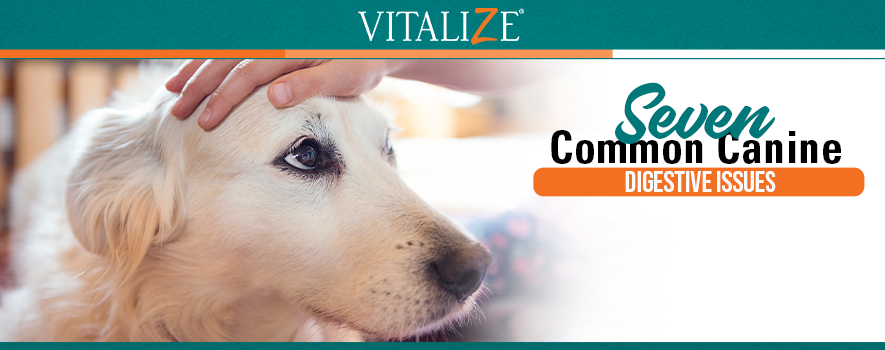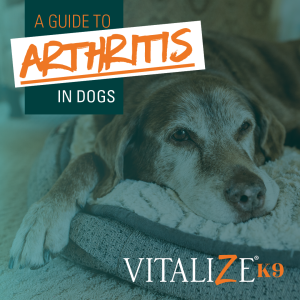
We never like to see our best friend down and out with an upset stomach. It’s even worse when it’s our four-legged friend that can’t tell us they don’t feel well, but are showing the classic signs: lack of appetite, not drinking enough water, acting depressed, increased fatigue, licking their lips or biting or gulping at the air.
Canine digestive issues are more common than you might think; however, like most things you can take a proactive approach to keeping your furry friend healthy and happy to avoid them. Not all digestive issues are avoidable, and then you need to look for ways to help your dog. Here are seven common canine digestive issues.
Vomiting: Dogs vomit if they eat too much or too fast. They could vomit if they eat too much grass, which is also a sign that they are lacking something in their diet. Of course, they could vomit for more serious reasons too, like they got into something toxic or they have swallowed something they are trying to get out of their system (like a small object). If your dog vomits once and appears better, there is likely little cause for concern; however, if your dog vomits multiple times in a short time period or vomits blood, it is best to seek your veterinarian’s attention.
Diarrhea: Diarrhea in dogs can be caused by simply eating the wrong thing, too many table scraps or changing your dog’s diet with a new dog food. Watch for watery or infrequent bowel movements and if diarrhea is persistent in a 24-hour period seek medical attention. Never give your dog a human diarrhea treatment, as the human medication can cause digestive upset.
Chocolate Toxicity: Chocolate is poisonous to dogs because it contains theobromine and caffeine, both of which can speed up the heart rate and stimulate dogs’ nervous systems. The amount and type of chocolate your dog ingests can have a greater impact on your dog, along with the size of your dog. For instance, cocoa powder is the most toxic, followed by unsweetened baker’s chocolate, semisweet chocolate, dark chocolate and milk chocolate. The best way to avoid chocolate toxicity is to keep all chocolate out of reach of your dog. If your dog eats a small cake crumb, it probably won’t be impacted; however, if it ingests an entire candy bar, you’d better contact your veterinarian immediately.
Worms: Intestinal worms in your dogs might be more common than you think, and the a few symptoms of worms have been mentioned above with both vomiting and diarrhea. Luckily worm prevention is fairly simple with a variety of approved dewormers on the market. As always, read and follow labels instructions.
IBD: Inflammatory bowel disease (IBD) is actually a syndrome, not a disease. The syndrome is caused by a specific reaction to chronic irritation of the intestinal tract. The inflammation interferes with the ability to digest and absorb nutrients. Most dogs with IBD have a history of recurrent or chronic vomiting and/or diarrhea and may have a poor appetite. Although the exact cause of IBD is unknown possible causes include parasitic or bacterial infection or adverse reaction to a specific protein in the diet. There is no “cure” for IBD, but the prognosis is typically good and treatments exist that include medication, a change in diet and including vitamin B12 in your dog’s diet.
Gastritis: Gastritis is an acute or chronic syndrome that causes vomiting and gastrointestinal inflammation. Typically, a dog will vomit consistently for a week to two weeks multiple times a day. There are multiple causes of gastritis, including but not limited to food or medication, another illness or immune disorder, a congenital disorder or food allergies, IBD, parasites, and hypereosinophilic syndrome (a blood disorder). As with any persistent vomiting, contact your veterinarian for diagnosis and treatment plans.
Pancreatitis: Pancreatitis in dogs is an inflammatory reaction within the pancreas that can result in abdominal pain, little to no appetite and vomiting. The inflammation results from the inappropriate, early activation of an enzyme within the pancreas and causes the pancreas to digest itself. Like other digestive canine upsets, pancreatitis is hard to diagnose and is often caused by high-fat foods, dogs that might have eaten garbage, but most of the time has no real cause. It can be treated with diet and other treatment plans so consult with your pet’s veterinarian.
While none of the above are fun for you or your canine companion to experience, you can take a proactive approach to provide your dog a #goodgutfeeling every day in hope to prevent these digestive issues. Vitalize® is a line of products for dogs with proven solutions to keep your animal healthy and performing. BioZyme® Inc., the makers of Vitalize include AO-Biotics® Amaferm®, a prebiotic research-proven to enhance digestibility in each of its products.
Vitalize® Dog is a granular vitamin and mineral supplement for dogs designed to support breeding and performance. This supplement to top dress on your dog’s food contains a high-quality blend of vitamins and minerals for daily support of any diet. It also contains omegas for healthy skin and hair.
Vitalize® Alimend® K9 is a liquid product for dogs designed to support gastric health and GI tissue and may relieve occasional gastric issues. In addition to Amaferm in also contains MHB3®, a patented high molecular weight hyaluronic acid that coats the stomach and support GI tissue integrity.
Vitalize® Dog Gel is a prebiotic and nutrient-rich gel for dogs designed to give immediate support to the digestive and immune system. It works fast to support appetite and hydration in instances when your dog might be exhibiting signs of discomfort from one of the digestive issues described above. Vitalize Dog Gel also contains MOS, which helps normalize gut microflora and supports the immune system.
Vitalize Dog and Vitalize Alimend K9 should be administered daily, just like you take a vitamin or supplement to keep yourself healthy. Vitalize Dog Gel is a fast-acting product that can support your dog’s appetite and hydration when needed.
Digestive upset is bound to happen, but you can do your best to keep your canine companions feeling their best and give them a #goodgutfeeling with Vitalize. To learn more about these products for your dogs or to discover where to buy them, visit www.vitalizek9.com.

